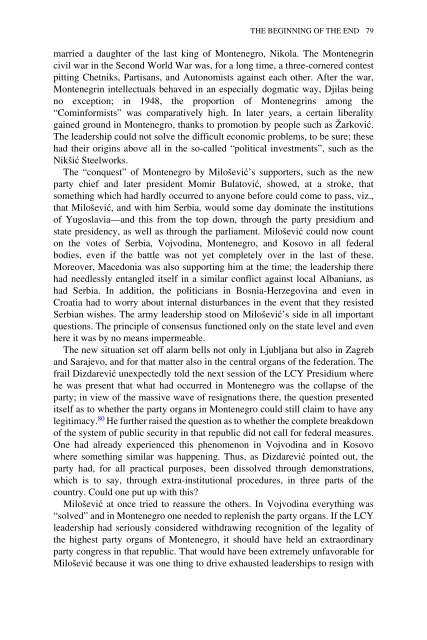Yugoslavia: A History of its Demise - Indymedia
Yugoslavia: A History of its Demise - Indymedia
Yugoslavia: A History of its Demise - Indymedia
You also want an ePaper? Increase the reach of your titles
YUMPU automatically turns print PDFs into web optimized ePapers that Google loves.
THE BEGINNING OF THE END 79<br />
married a daughter <strong>of</strong> the last king <strong>of</strong> Montenegro, Nikola. The Montenegrin<br />
civil war in the Second World War was, for a long time, a three-cornered contest<br />
pitting Chetniks, Partisans, and Autonomists against each other. After the war,<br />
Montenegrin intellectuals behaved in an especially dogmatic way, Djilas being<br />
no exception; in 1948, the proportion <strong>of</strong> Montenegrins among the<br />
“Cominformists” was comparatively high. In later years, a certain liberality<br />
gained ground in Montenegro, thanks to promotion by people such as Žarković.<br />
The leadership could not solve the difficult economic problems, to be sure; these<br />
had their origins above all in the so-called “political investments”, such as the<br />
Nikšić Steelworks.<br />
The “conquest” <strong>of</strong> Montenegro by Milošević’s supporters, such as the new<br />
party chief and later president Momir Bulatović, showed, at a stroke, that<br />
something which had hardly occurred to anyone before could come to pass, viz.,<br />
that Milošević, and with him Serbia, would some day dominate the institutions<br />
<strong>of</strong> <strong>Yugoslavia</strong>—and this from the top down, through the party presidium and<br />
state presidency, as well as through the parliament. Milošević could now count<br />
on the votes <strong>of</strong> Serbia, Vojvodina, Montenegro, and Kosovo in all federal<br />
bodies, even if the battle was not yet completely over in the last <strong>of</strong> these.<br />
Moreover, Macedonia was also supporting him at the time; the leadership there<br />
had needlessly entangled <strong>its</strong>elf in a similar conflict against local Albanians, as<br />
had Serbia. In addition, the politicians in Bosnia-Herzegovina and even in<br />
Croatia had to worry about internal disturbances in the event that they resisted<br />
Serbian wishes. The army leadership stood on Milošević’s side in all important<br />
questions. The principle <strong>of</strong> consensus functioned only on the state level and even<br />
here it was by no means impermeable.<br />
The new situation set <strong>of</strong>f alarm bells not only in Ljubljana but also in Zagreb<br />
and Sarajevo, and for that matter also in the central organs <strong>of</strong> the federation. The<br />
frail Dizdarević unexpectedly told the next session <strong>of</strong> the LCY Presidium where<br />
he was present that what had occurred in Montenegro was the collapse <strong>of</strong> the<br />
party; in view <strong>of</strong> the massive wave <strong>of</strong> resignations there, the question presented<br />
<strong>its</strong>elf as to whether the party organs in Montenegro could still claim to have any<br />
legitimacy. 80 He further raised the question as to whether the complete breakdown<br />
<strong>of</strong> the system <strong>of</strong> public security in that republic did not call for federal measures.<br />
One had already experienced this phenomenon in Vojvodina and in Kosovo<br />
where something similar was happening. Thus, as Dizdarević pointed out, the<br />
party had, for all practical purposes, been dissolved through demonstrations,<br />
which is to say, through extra-institutional procedures, in three parts <strong>of</strong> the<br />
country. Could one put up with this<br />
Milošević at once tried to reassure the others. In Vojvodina everything was<br />
“solved” and in Montenegro one needed to replenish the party organs. If the LCY<br />
leadership had seriously considered withdrawing recognition <strong>of</strong> the legality <strong>of</strong><br />
the highest party organs <strong>of</strong> Montenegro, it should have held an extraordinary<br />
party congress in that republic. That would have been extremely unfavorable for<br />
Milošević because it was one thing to drive exhausted leaderships to resign with
















